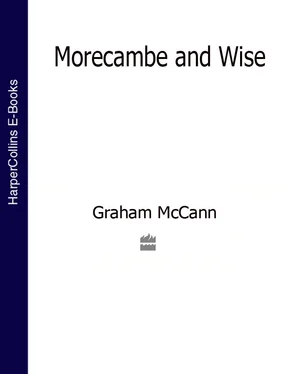Eric Morecambe was fond of informing people that he had taken his name from the place of his birth: Eric. His real name, in fact, was John Eric Bartholomew, and the actual place of his birth was the small North Lancashire seaside town of Morecambe. 1
He came, as he often said, from an ordinary working-class family. 2His father, George Bartholomew, had worked as a labourer for the Morecambe and Heysham Corporation since leaving school at the age of fourteen. His mother, Sarah (‘Sadie’) Elizabeth Bartholomew (née Robinson), had worked as a cotton weaver and later as a waitress, but she was often obliged to take on a variety of part-time jobs in order to supplement a very modest family income.
They had, in terms of background, much in common with each other. Both came from large families: George had seven brothers and three sisters, Sadie three sisters and two brothers. George had grown up in Morecambe, Sadie in nearby Lancaster. Both had known considerable hardship, and both – each in their own distinctive ways – harboured hopes of a less onerous future.
As personalities, however, they were stark opposites. George, a tall, thin man with a long, narrow face, slightly protruding ears, sharp, attentive eyes and a hairstyle topped off by a Stan Laurel tuft, was by all accounts an even-tempered, warm, happy-go-lucky character who always gave the impression of being more concerned with enjoying what he had than with yearning for what he continued to lack. Sadie, a short, somewhat thick-set woman with dark curly hair, faintly quizzical grey eyes, full cheeks, a sharp wit and, if anything, an even sharper tongue, was a naturally intelligent, imaginative, doughty woman who, had she been born in more propitious times and more fortunate circumstances, might well have pursued an interesting and rewarding career of her own.
They had met at a dance at the Winter Gardens in Morecambe, but their respective reactions to the occasion said much, in retrospect, about their subsequent relationship: whereas George had been sufficiently impressed by Sadie to consider the possibility of an open-ended series of dates, Sadie had decided, there and then, that George Bartholomew was the man she would marry. Sadie got her way. A relatively short time after, on 26 February 1921, they were married in nearby Accrington. Their first and only child, John Eric, was born – somewhat unexpectedly – at 12.30 p.m. on 14 May 1926 (‘If my father hadn’t been so shy I would have been two years older.’ 3) in the front living-room of a neighbour’s house at 42 Buxton Street, Morecambe. 4The Bartholomew family’s own house, at 48 Buxton Street, would be the house that Eric would come to think of as his first home, but he and his parents could not have stayed there for more than a few short months, because the building was by then in a state of terminal disrepair.
His first vivid memory, he would always say, was of the ceiling having fallen in: ‘I remember being lifted on to the kitchen table by my mother and having my coat pulled on and my scarf tied round my neck, and being taken out of the house.’ 5He would have been no more than ten months old at the time. 6The unwelcome and unexpected period of disruption turned out, however, to have been something of a blessing in disguise, because the local Corporation relocated the family into a relatively new and reassuringly sturdy council house – ‘with three bedrooms and an outside loo’ 7– at 43 Christie Avenue. A measure of stability and security for the Bartholomews had, at last, been achieved.
The next few years were, Eric would admit, ‘hazy’ 8in his memory, but his mother likened her infant son to ‘a little doll with a head of blond curls’. 9He was, it seems, a rather precocious baby, beginning to walk at around nine or ten months old, and learning to speak soon after that. Sadie would always insist, sometimes over the top of her adult son’s meek objections, that he was a born performer:
We had a gramophone and he knew every record we possessed. It’s clear in my memory … He would come in and say, ‘What do you want playing?’ ‘Play me so and so,’ I’d say. He would go through the records, and though he couldn’t read, he would find the very one I had named, put it on, and start dancing to it.
Whenever we took him out to relatives, all he wanted to do was perform ... ‘I want to do my party piece. I want to sing and dance.’
‘Wait a minute, love,’ he would be told.
I remember one particular night when the pianist told him to wait, and he said, ‘All right, I’ll wait under the table.’ He must have been about three. From time to time he would announce, ‘I’m here, and I’m still waiting.’ 10
Eric could, Sadie recalled, be ‘quite a handful.’ 11Both she and her husband had to remember never to leave their front door ajar; they knew that little Eric, had he ever glimpsed a chink of light through the narrowest of gaps, would have pushed the door wide open and wandered off down the street in search of adventure. Whenever Sadie needed to take him shopping with her she found that the only thing she could do to keep him still while she prepared for the trip was to tie him by his scarf to the door-knob and let him sit outside on the step. Even this, however, was sometimes not enough to hold him: on one occasion he managed to convince a passerby that he had tied himself – as part of some obscure prank – too tightly to the door, and needed the assistance of a kind-hearted individual to help him get free. An anxious Sadie tracked him down, eventually, to a damp and dirty building site some distance away at the bottom of Lancaster Road. She found him entertaining the workers by reciting nursery rhymes and performing such songs as ‘Blue Moon’ and ‘I’m Dancing with Tears in My Eyes’, and encouraging them to reward him by tossing coins into his strategically positioned tam-o’-shanter:
When I got there his little white suit was spattered with mud, his shoes and socks were caked where he had squelched through a really sticky patch, and his face was filthy. He saw me and announced to his audience, ‘I’d better go now, there’s me Mam.’
One of the builders said, ‘That little lad’s a wonderful entertainer.’
‘I’ll entertain him when I get him home,’ I said.
‘Oh,’ said Eric, ‘that means I will have to have my bottom slapped, won’t I, Mum?’
‘You’ve never spoken a truer word.’
‘Well, folks,’ said Eric to his audience, ‘I’ll have to be going. Goodbye everybody. See you tomorrow.’ 12
It was, in spite of the usual kind of deprivations and occasional crises experienced by all working-class families of the period, a happy childhood. ‘I have wonderful memories of both my mother and father,’ Eric would later remark, ‘absolutely fantastic memories, and I think of them a lot and with great happiness.’ 13The gentle, easy-going George, his family always said, would start whistling contentedly to himself ‘from the moment his feet touched the ground each morning’. 14He took great pleasure in spending time with his son watching football matches (often at the modest little ground of Morecambe FC; sometimes, as an occasional treat, thirty miles away at Deepdale, the altogether more impressive stadium of Preston North End). George would also take Eric fishing, or picking mushrooms in the fields around their home, and sometimes for long and rambling walks around the town reminiscing about his own childhood days and telling elaborate, funny stories that frequently concealed unexpected twists in their tail. Sadie, Eric remembered, had less time to spare – understandably – for casual outings, but whenever her work brought her into contact with any aspect of the entertainment world she would make a point of bringing him along for a tantalising glimpse behind the scenes. When an opportunity did present itself for a family excursion of some kind or another it was always made the most of. A photograph dating from 1932, for example, pictures what appears to be the end of a very enjoyable afternoon out in the sun, with George, Sadie and Eric sitting down close together on the grass, their makeshift tent standing behind them, all smiling broadly and each with a ukulele in their hands.
Читать дальше











![Brian Thompson - A Monkey Among Crocodiles - The Life, Loves and Lawsuits of Mrs Georgina Weldon – a disastrous Victorian [Text only]](/books/704922/brian-thompson-a-monkey-among-crocodiles-the-life-thumb.webp)
